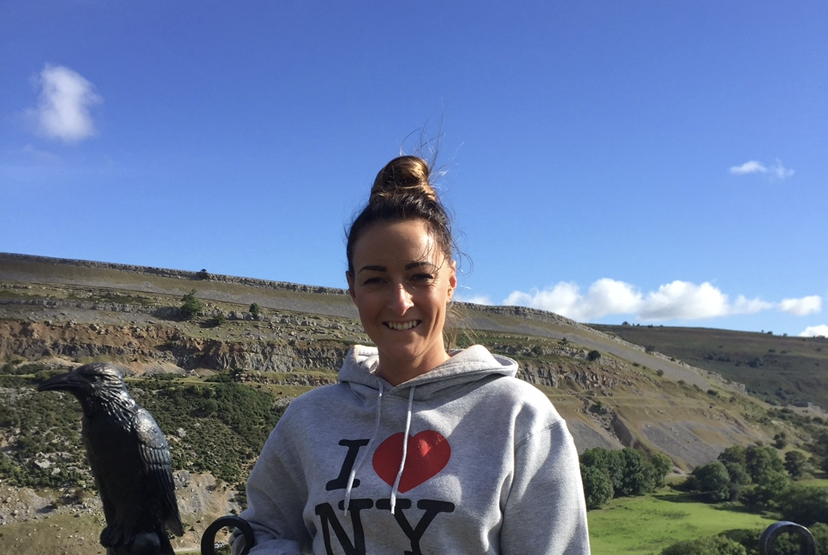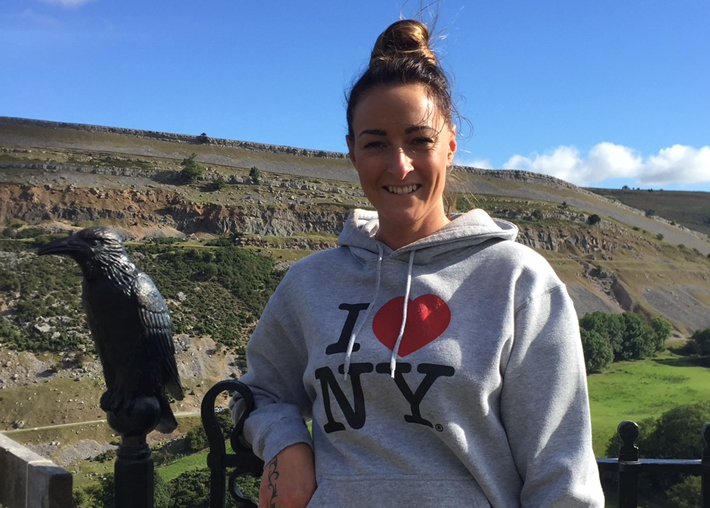Gaining training and qualifications while working in care

Around one in 17 adults in Wales work in social care, early years or childcare – that’s around 113,000 people!
If you have a positive attitude and a commitment to care for others, then for most roles you can gain any training and qualifications you need on the job.
Kayleigh Evans, a Senior Childcare Worker from Wrexham, has worked within the care industry for over 14 years. Here, she tells us how she’s developed her knowledge and skills and gained her required qualifications while working.
How did you start working in the care sector?
My journey as a care worker started when I was 16 years old. I started off washing pots in the kitchen of a nursing home and I loved interacting with the elderly patients at mealtimes.
I was occasionally asked to work as a care worker. At first it felt a little scary, however, I loved it! Helping assist the elderly and vulnerable people with their daily needs, knowing that I’d made someone feel comfortable, happy, and safe, felt very rewarding.
Did you have any qualifications or training?
 I didn’t have any qualifications or training when I started working in the nursing home. Once I started working as a care worker, I was given the opportunity to complete my NVQ level 2 and 3 in adult health and social care.
I didn’t have any qualifications or training when I started working in the nursing home. Once I started working as a care worker, I was given the opportunity to complete my NVQ level 2 and 3 in adult health and social care.
Why did you make the move to work with children?
My journey as a childcare worker started when a friend told me there were vacancies at the home where she worked. She said the job would suit me, so I thought why not! It was a respite home for children with learning difficulties.
I worked there for six years and learned numerous skills, such as sign language, Makaton, managing difficult behaviours and understanding autism.
A new opportunity arose at another care home that provided better working hours for me and my family. I had no idea what type of training was needed, but as I’m naturally talkative, a good listener, caring and like to work with others, I thought I’d give it ago.
Can you describe your role as a childcare worker?
I teach children and young people basic life skills, things that we can all take for granted, like:
- taking care of personal hygiene
- supporting educational needs
- helping prepare healthy nutritious meals
- keeping personal space clean and tidy
- how to build positive relationships with families and friends.
Most importantly, I help children and young people manage their emotions and troubles in a safe, effective way as many have unfortunately had traumatic pasts.
The greatest feeling is seeing these changes take place. It’s a great feeling when the children and young people in my care achieve these skills and, when ready, can move into adulthood.
At times, working with children in care can be difficult, but it’s a very rewarding job. Being able to provide a safe, happy, caring environment for the children and young people in my care gives me great pride in the work that I do.
Do you need experience or qualifications to do your role?
You don’t need qualifications to be a childcare worker, but it can help with the application process. However, you’re required to complete a level 3 diploma in childcare within your firsts two years in the role. It’s a job where you can gain qualifications, training, and experience as you progress with your work.
To become a senior care worker, you have to have a level 3 diploma in childcare, as well as other qualities, such as being a good communicator, able to remain calm under pressure, able to give direction, have your own initiative and confidence when dealing with challenging situations.
 What sort of training did you have?
What sort of training did you have?
I was provided with the relevant training for my job, such as the importance of report writing, first aid training, an introduction to the children I’d be caring for and the ethos of the company. I had to do some shadow shifts, where I joined an experienced care worker to learn about the work. I spent time learning how to communicate with the children and young people, the rules of the house, the routines of young people and what expectations they had for the children and young people that lived there. I also had to read a lot of documents, which was a little daunting at first, but it really helped prepare me to be able to provide the best, safest care possible.
For my current role, as a senior care worker, I’ve completed a level 3 diploma in health and social care for children and young people. I’ve also carried out training in the codes of practice, safeguarding, child protection, autism awareness, understanding mental health, administration of medication, working with families, understanding the rights of children and managing challenging behaviours.
I’ve received a very high standard of training tailored to my job role and workplace. This has helped enable me to deliver good quality care.
Why should people consider working in care?
If you love caring for others, are non-judgmental, love working as part of a team and want to support people to have a better future, then I’d really encourage you to look into working in care.
It’s important to be transparent, to be non-judgmental, to work with integrity and to treat everyone as an individual to ensure their needs are met.
The hours can be long and the rate of pay doesn’t always reflect the responsibility of the job role, but we deliver support and inspire children and young people to achieve positive changes in their lives to help them have a better future – this is why I love my job.
I absolutely love my profession and would definitely encourage anyone to consider a career in care!



